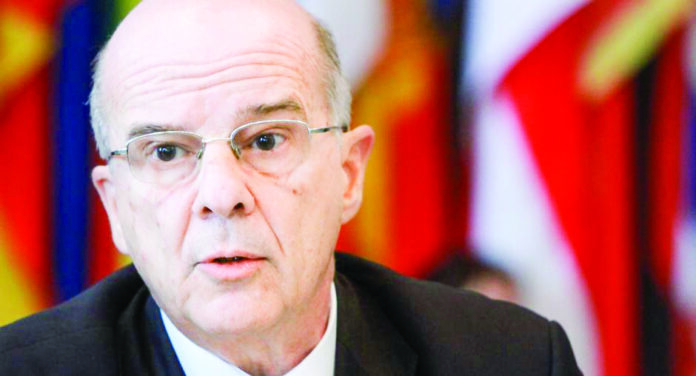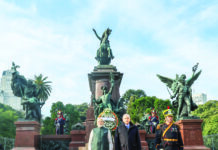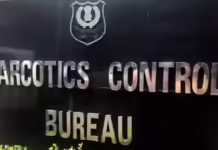‘Joint military exercises in the Indian Ocean and in the Mediterranean and Aegean Seas would constitute a warning to Turkey and to Pakistan.’
NEW DELHI: In an email conversation with The Sunday Guardian, Leonidas Chrysanthopoulos, former Greek ambassador to Canada, Poland and Armenia, and Consul General to Turkey, as well as Secretary General of the Black Sea Economic Cooperation Organisation (BSEC) based in Istanbul from 2006-2012, spoke on the role Turkey is playing in the Mediterranean, also how India and Greece can enhance their relations to take on Recep Tayyip Erdogan in particular.
Q: Ambassador, with your vast knowledge of Turkey as a senior Greek diplomat, what role would you say Turkey is playing in your part of the world?
A: Turkey is playing a very important role in our part of the world. This is basically due to the balanced approach that Ankara had adopted in the Ukrainian crisis, where, in spite of being a NATO member, refused to adopt sanctions against Moscow, delivered drones to Kiev and offered to host and hosted peace talks between Moscow and Kiev. Turkey has also developed a very strong arms industry and is exporting weapons all over the globe. Turkey is also expanding its influence in Africa and maintains military bases in Libya and Sudan. Ankara supports the Palestinian cause and has condemned the policy of genocide committed by Israel in Gaza. The West considers Turkey as a very important member of NATO and does not react to human rights violations that have always taken place in that country. There were lukewarm reactions from the West when the mayor of Istanbul, Ekrem Imamoglu was arrested. Another serious problem that the Turks face is the Kurdish issue. Between 30 to 46 million Kurds inhabit Turkey. The Kurdish population has been discriminated against, and the Kurdish cities of Eastern Turkey are usually left without effective medical facilities or social welfare. Kurdish mayors have been replaced by government officials. The PKK, a Kurdish liberation movement, considered as a terrorist organization in Turkey and by the West, had waged a war from 1984 until recently when they decided to dismantle and start negotiations with the government on the proper integration of the Kurdish community in Turkish society. There is a big Kurdish community also in Syria and Iraq. In the latter it has achieved the status of semi-autonomy.
Q: What sort of a power do you see Turkey as? Revisionist, status quoist, or something else?
A: I would see Turkey as a revisionist power since it is trying to change existing beliefs on how historical events happened and refuses to read correctly the contents of international treaties that involve also Greece.
Q: Would you say that Turkey, specifically Erdogan, is trying to position himself as the leader of the Islamic world? Is he thinking in terms of an Islamic Caliphate?
A: Yes, Erdogan is trying to establish himself as leader of the Islamic world and one can say that he has almost achieved that goal. But his aim goes further than that, since he wants Turkey to have the power and the influence that it had during the Ottoman Empire that collapsed after the first World War.
Q: In Erdogan’s scheme of things, what role have terror groups played, starting with but not necessarily confined to ISIS?
A: Turkey joined the war against ISIS in 2016, only after ISIS attacked Turkey. It maintains excellent relations with the Palestinian organisation Hamas, while it has lukewarm to negative relations with the Lebanon-based Hezbollah that is supported by Iran. Erdogan has openly supported Hamas and used it to increase his influence in the Middle East, with success.
Q: What are Greece-Turkey relations like?
A: Relations between Greece and Turkey are not good, in spite of the fact that the Greek government wants to present them as being so. Turkey has been raising many issues with Greece, basically concerning the delimitation of the sea borders in the Aegean, the air space as well as minority issues. The legal status of relations between Greece and Turkey is defined in the 1923 Lausanne Agreement, which has been torn apart by Ankara. Turkey is accusing Greece that it has militarized the islands of the Aegean, which is false. The Lausanne Agreement mentions that there should be no military bases on some of the islands and there are not. Turkey insists that our territorial waters should not extend more than six nautical miles, while we have the right to extend them to 12 according to the Law of the Seas Treaty. Ankara has passed a law by which if Greece extends its territorial sea limits to 12 nautical miles, then that act would be considered as a casus belli (a reason to declare war). Turkey also says that the islands do not have a continental shelf which is again wrong since the UNCLOS Treaty of the Law of the Sea says the opposite. Furthermore, Turkey is harassing Greek efforts to make an underwater electrical connection between Greece and Cyprus, saying that Athens must first ask for permission from Ankara, and is sending warships to impede the laying of the cable. One, however, must take into consideration that until 1972 there was no problem between Greece and Turkey on the question of territorial waters. The issue started when Greece discovered oil in the northern Aegean. Turkey would like to take over some of the Greek islands that are close to Turkey, and perhaps the area of Northern Greece where there is a Muslim minority. The continuous occupation of the northern part of the Republic of Cyprus after the Turkish invasion of 1974 is not helping the situation.
Q: How are India-Greece relations like and how can they be improved?
A: Relations between India and Greece are flourishing and could not be better. Our relations go back deep into history even long before the time of Alexander the Great. There is a constant exchange of high-level visits to Athens and Delhi. Last February, the Greek Prime Minister visited India, while this February the Greek Foreign Minister made an official visit to New Delhi. Prime Minister Narendra Modi visited Greece in 2023. Our relations are cemented by many bilateral agreements that even cover military cooperation. Relations are booming in the area of culture and India was also invited to participate in the Forum of Ancient Civilizations, a Greek initiative started in 2018. There are also 300-350,000 Indians residing in Greece and constitute a well-respected community. Implementation of all bilateral agreements is the best way of further improving our bilateral relations.
Q: Can India-Greece relations act as a bulwark against Erdogan, especially since he is actively working with Pakistan to destabilise India? If yes, how?
A: Greece and India can act as a bulwark against Erdogan. Some practical suggestions. An enhanced cooperation in the military field particularly in Air Force cooperation. It would be helpful to Greece if the Indian Air Force could provide Athens information on how the Rafales performed during the short conflict that India recently had with Pakistan. Joint military exercises in the Indian Ocean and in the Mediterranean and Aegean Seas would constitute a warning to Turkey and to Pakistan to act according to international law. More open support of Greece to India on the Kashmir issue and India to Greece on issues and threats that Turkey uses against Greece. Closer cooperation between Athens and Delhi at the UN and other international fora. Finally, an effective cooperation in nuclear technology between the two sides would make Turkey and Pakistan think twice before creating conditions for armed conflicts.








